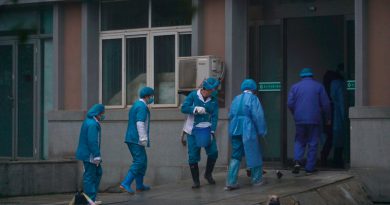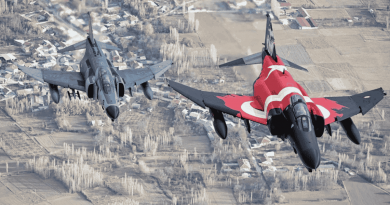Iran-backed attacks in Iraq risks uncontrollable escalation, says U.S. official
Baghdad (Reuters) – A senior U.S. military official said on Wednesday attacks by Iranian-backed groups on bases hosting U.S. forces in Iraq were gathering pace and becoming more sophisticated, pushing all sides closer to an uncontrollable escalation.
His warning came two days after four Katyusha rockets struck a base near Baghdad international airport, wounding five members of Iraq’s elite Counter-Terrorism Service.
It was the latest in a spate of rocket strikes in the past five weeks on military installations hosting members of the U.S.-led coalition whose objective is to defeat Islamic State insurgents. The official said the attacks were jeopardizing the coalition’s ability to combat Islamic State insurgents.
Tension between the United States and Iran has ramped up in the region over U.S. economic sanctions that are hitting Tehran hard. The two sides have traded blame over attacks on oil installations, militia arms depots as well as military bases hosting U.S. forces.
“We’re used to harassing fire,” said the military official, who spoke on condition of anonymity. “But the pace of (that) was (previously) pretty episodic … (Now) the level of complexity is increasing, the volume of rockets being shot in a single volley is increasing and is very concerning to us.”
The official added: “There is a point at which their actions change things on the ground and make it more likely that some other actions, some other choices made – by somebody, whether it’s them or us – will escalate unintentionally.”
The military official said Iranian-armed militias were approaching a red line where the coalition would respond with force, and “no one will like the outcome”.
There have been no claims of responsibility for any of the attacks. However the U.S. military official said intelligence and forensic analyses of the rockets and launchers pointed to Iranian-backed Shi’ite Muslim militia groups, notably Kataib Hezbollah and Asaib Ahl al-Haq (AAH).
Iraqi paramilitary groups have in turn accused the United States and Israel of bombing their weapons depots and bases.
Most of Iraq’s Shi’ite militia groups are part of the Popular Mobilization Forces (PMF), an umbrella that has allies in parliament and government. They report to the prime minister but have their own command structure outside the military.
The military official said Iraq’s Shi’ite-led government had not taken action over the incidents. “It’s very concerning to me…That it’s acceptable that we’re getting attacked by elements that are supposedly being brought in under the heel of the Iraqi government as part of its security forces.”
Prime Minister Adel Abdul Mahdi resigned last month under pressure from mass anti-government protests. He is currently carrying out his duties in a caretaker capacity.
Militia groups used a converted flatbed truck to launch a barrage of 17 rockets on the Qayyara military base south of Mosul on Nov. 8, the U.S. military official said.
He said the incident caused no major damage or loss of life, but the technique was replicated in attacks on both Balad and Ain Al-Asad air bases last week, using rockets large enough to cause significant damage to living compounds and runways at Ain Al-Asad.
Friday’s attack near Baghdad airport was with significantly larger 240-millimeter rockets not known to have been used in Iraq since 2011.



